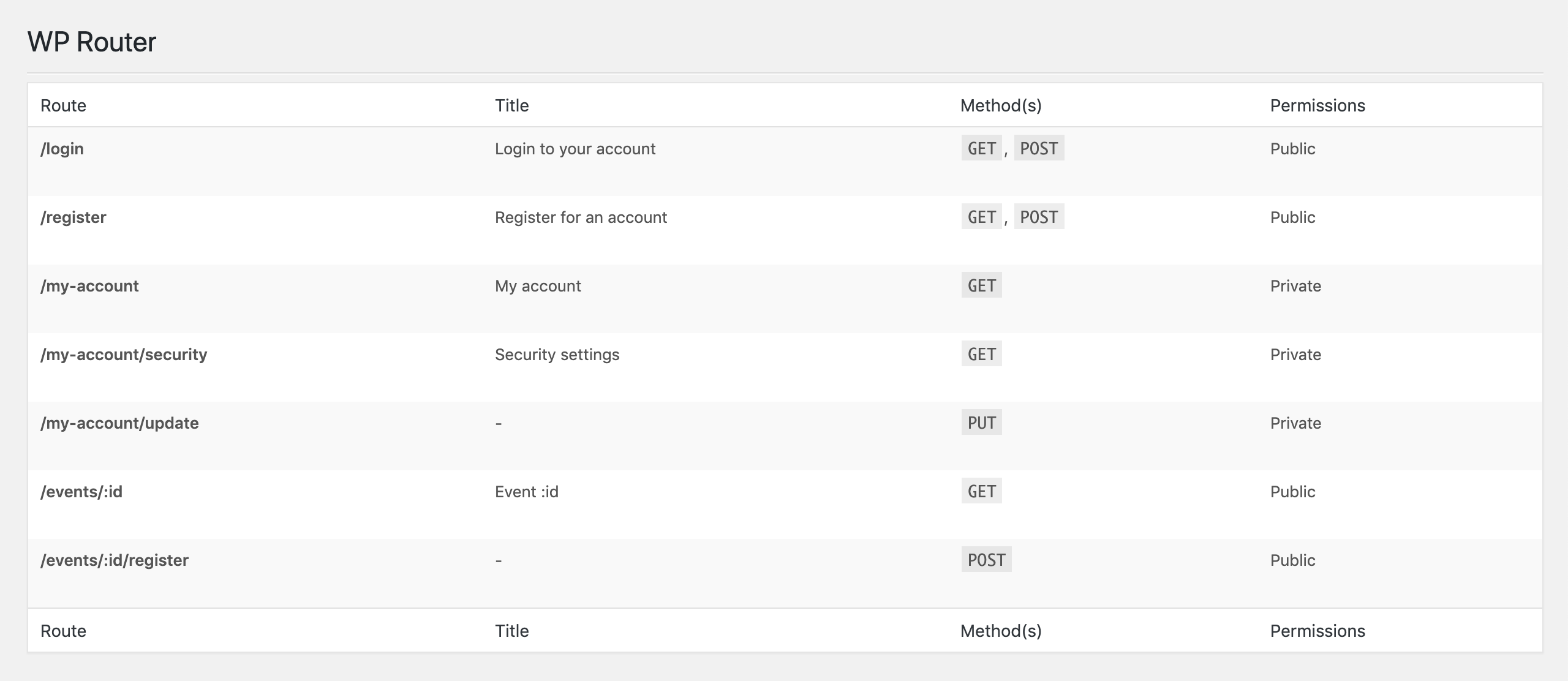Easily create custom WordPress routes with this plugin and helper functions.
Comes with an easy to use API and basic admin panel. Now with basic support for Yoast SEO.
PHP Version 7.2+ WordPress Version 5.2+
Once the plugin has been installed and activated it's easy to start registering routes with the helper functions. A full list of functions is available below.
Example 1 - Login page
To create the route, simply use wp_router_get() in your functions.php file along with the appropriate parameters.
wp_router_get( '/login', function( $router ) {
// Stop user from accessing if already logged in
if ( is_user_logged_in() ) {
wp_redirect( home_url() );
exit;
}
// Load form template
get_template_part( 'forms/login' );
}, [ 'title' => 'Login' ] );Example 2 - Post request
We can create a POST request only route in a similar way to example 1 but instead using wp_router_post().
$route_capabilities = [
'private' => true,
'capability' => 'subscriber'
];
function profile_save() {
$user_id = get_current_user_id();
$name = sanitize_text_field( $_POST[ 'name' ] );
$email = is_email( $_POST[ 'email' ] );
wp_update_user( [
'ID' => get_current_user_id(),
'display_name' => $name,
'user_email' => $email
] );
wp_reditect( home_url( '/profile/success' ) );
exit;
}
wp_router_post( '/profile/save', 'profile_save', $route_capabilities );Example 3 - URL Parameters
Sometimes you will need to capture segments of the URI within your route. For example, you may need to capture a user's ID from the URL. We can do this with the : operator.
class CustomUser {
function __construct() {
wp_router_get( '/user/:id', [ $this, 'handle' ] );
}
public function handle( $params ) {
$id = $params[ 'id' ];
return 'User ' . $id;
}
}
new CustomUser;wp_router_register( string|array $method, string $route, callable $callback, array $options )
Register a route with a specific request method.
$method
(string|array) (Required) The type of method to for the route to match. Accepts an array or string of the following methods... GET, POST, HEAD, PUT, DELETE, ANY.
$route
(string) (Required) The url route to match. This can include catchable parameters by using the : operator.
For example /locations/:country/:city and /:author/books
$callback
(callable) (Required) The name of the function you wish to be called when the route is matched.
$options
(array) (Optional) Additional parameters to passed to the route object.
wp_router_register( 'POST', '/profile', function( $params ) {
// Do something with $_POST data
} );
...
wp_router_register( 'GET', '/movies/:year', function( $params ) {
get_template_part( 'movies', $params[ 'year' ] );
} );| Alias | Params | Same as |
|---|---|---|
wp_router_get() |
$route, $callback, $options | wp_router_register( 'GET', ... ) |
wp_router_post() |
$route, $callback, $options | wp_router_register( 'POST', ... ) |
wp_router_head() |
$route, $callback, $options | wp_router_register( 'HEAD', ... ) |
wp_router_put() |
$route, $callback, $options | wp_router_register( 'PUT', ... ) |
wp_router_delete() |
$route, $callback, $options | wp_router_register( 'DELETE', ... ) |
wp_router_params()
Get an array of route parameters if any.
wp_router_get( '/path/:param1/:param2/:third', function() {
$params = wp_router_params();
echo $params[ 'param1' ];
echo $params[ 'param2' ];
echo $params[ 'third' ];
} );wp_router_param( string $param, mixed $fallback = false )
Return a single value of a route parameter.
$param
(string) (Required) Name of the parameter you want returned.
$fallback
(mixed) (Optional) The fallback value if a parameter is empty.
wp_router_get( '/path/:param1/:param2/:third', function() {
echo wp_router_param( 'param1' );
echo wp_router_param( 'param2' );
echo wp_router_param( 'third' );
} );is_wp_router()
Call anywhere within WordPress to check if the current URL matched a custom route.
(false|WP_Route) Returns the route object if is a match. Else will return false.
if ( function_exists( 'is_wp_router' ) && is_wp_router() ) {
echo 'This page is a custom route!';
}There are additional options that can be passed in the $options parameter.
| Option | Description | Default |
|---|---|---|
title |
(string) Add a title to the page, accessible via the WordPress functions get_title() and the_title(). |
null |
body_class |
(string) Add custom classes to the body for the specific route. | null |
robots |
(bool) Add nofollow and noindex to the request page header. | false |
private |
(bool) Use this option to expose the route to authenticated users only. | false |
capabilities |
(string) Used in conjunction with private option. Only allow specific roles or capabilities to access the route. |
'manage_options' |
wp_router_get( '/profile', function() { ... }, [
'title' => 'My Profile',
'body_class' => 'user-page user-page-profile',
'robots' => true, // Stop bots
'private' => true, // Only authed users
'capabilities' => 'subscriber' // Subscribers only
] );